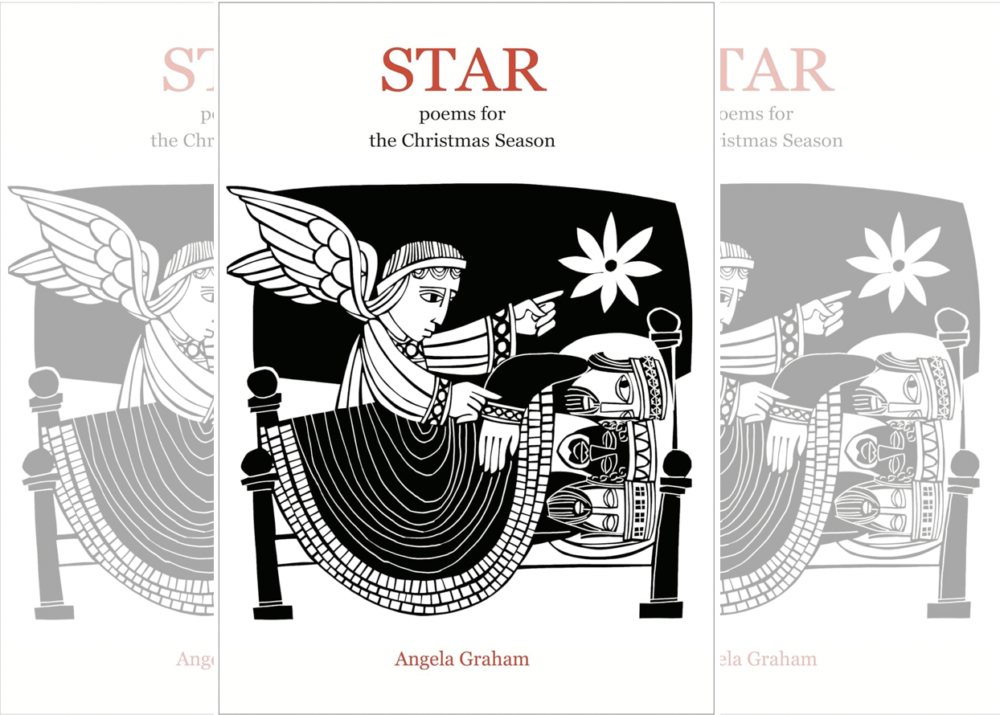Poetry review: STAR: poems for the Christmas season by Angela Graham

clare e. potter
STAR, a collection of thirty-two poems, is a gift. These expertly crafted poems, how they stir astonishment, wonder, reflection, and speak with the accompanying illustrations is utterly compelling. I enjoyed this book as much for its physicality as I did for Graham’s poetic skill.
The illustrations, linocuts by Martin Erspamer, OSB, are exquisite and purposeful, adding to the already rich depths the poems conjure.
The title reads that STAR is a body of poems ‘for the Christmas Season,’ and while these poems are centered around that season and what it has come to represent (in current-day Cardiff, Scotland and even back to the Biblical nativity) the meaning and call to being alert are relevant (and necessary) beyond Christmastime.
Damage
The poems in STAR help us look at the damage we’ve done to our planet, to ponder what will redeem it. Our gaze is also directed to current political problems, ‘men of might’ and refugees, who the women are that matter, have consistently been erased or romanticized, and ‘who else?’
To explore what Christmas really means, and further: ‘what next?’ And, why haven’t things changed in two thousand years.
On so many levels, STAR is a book that illuminates, ‘whatever shines, sees.’ In the first sonnet, ‘Shining,’ a window is gleaming, lights the way for the poems in the book.
The shining manifests as ‘beaming,’ as ‘burnish’ ‘glow’ and ‘glint;’ the light here is to attract our attention, to suggest a way to navigate, but also to remind us that in order for there to be ‘light’ we have to participate, polishing furniture and brass, stringing fairy lights, questioning the cost of our many violences and to connect with the light within us.
‘Shining’ makes us think not only of how something shines and is seen, but the very source of light itself and how we might connect with it—beyond the seeing. In ‘Reading Christmas Poems,’ for instance, we are transposed to a city, a new house and its limited space ‘window pots of puce and purple cyclamen,’ and artificial cherry lights. But even here, there’s hope that amongst the crowds and curtailing street-lamps, while angels sing, someone
looked up and heard
the stillness
when they drew breath
between each stanza of their praise.
I admired Angela Graham’s use of spacing within each poem, between each poem, in relation to the illustrations. Space enough for that drawing of breath to be heard.
Tender
‘The Christmas Card,’ is a tender evocation of a card sent annually from an unknown sender to a previous owner of the house, the lack of return address is a great metaphor for a lack of a tangible direct-line to a source, be that a god, or a meaning, and that this is why faith is important. But more, that the sender, too, has faith that a message of goodwill and love will find its way. This was a favourite poem for me.
The book is more than stars and light, it is portal and threshold: arcades, doors ajar, wombs and out-houses, the old and new year, a baby Jesus, a refugee mother birthing in ‘among the tractor parts and oil cans.’ There is tension in these between places where things might and do and don’t yet happen. We are paused there in a modern-day nativity, in ‘December’ where the speaker offers a coat to the new father, a refugee, who ‘mightn’t understand the words but he’ll get the drift.’
Re-invention
This re-invention of the nativity allows us to consider how we might be missing something with such potential to heal and teach, especially given that we are often without light, obstructed in narratives and prejudices ‘who let those bastards in?’ (about the two ‘worst tossers from the Farmer’s Arms’).
The choice to have the speaker relay this birth scene colloquially ‘a bloody baby splodgin out between her legs’ makes us think of place and belonging. How we assert ownership but how, also welcome might happen, ‘I take my jacket off and put it round him [the new father].’
What we might not have the words for, Angela Graham summons them up. Her six poems about the three kings and their wives-queens made here in their own right-are original and of particular richness. For instance Balthazar’s wife ‘beneath her deferential bow’ seeks knowledge of astrology ‘out-stripping and out-thinking’ her husband who’d been given the gift to follow the star to the infant birth.
These three queen poems are alchemical; Balthazar’s wife becomes the star she sought to know, the star, possibly, that the three kings followed. These poems are a special brilliance.
Lights
The poems in this collection interlink like strung lights, with words or images, concepts flowing from one poem to the next and just like the decorating of a Christmas tree, it’s when you step back and consider the whole that the gift is really received.
STAR then, is a book you read and then re-read, stepping back and taking in not only the hope that resounds but also to consider not only what it means to gift, but to be a gift.
To value our inner light, our potential to change and receive and give. To become the eye open to the call to follow ‘the god of new beginnings.’
Buy this book for your loved ones for Christmas. It is full of promise for a more hopeful future. The promise that things can be better in our world.
STAR: poems for the Christmas season by Angela Graham is published by Culture & Democracy Press and is available from all good bookshops. It is the Books Council of Wales’ English language Book of the Month for December.
Support our Nation today
For the price of a cup of coffee a month you can help us create an independent, not-for-profit, national news service for the people of Wales, by the people of Wales.





